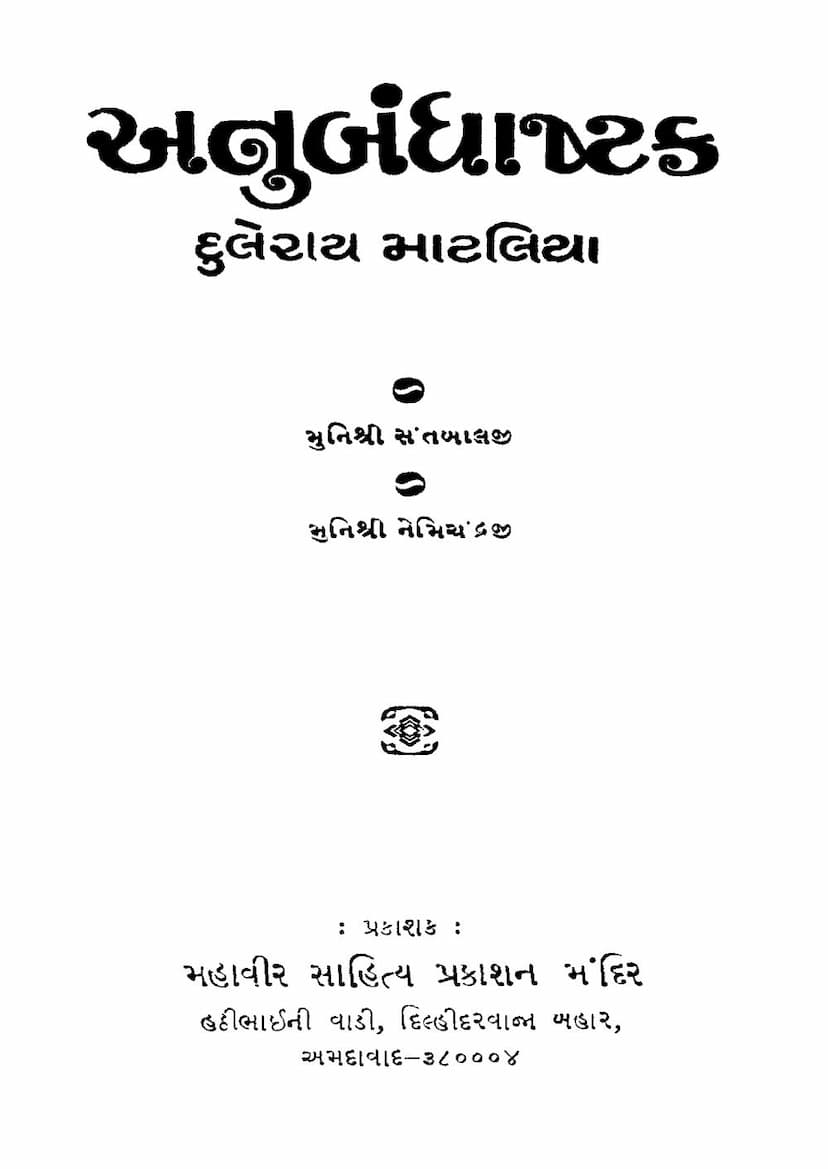Anubandhashtak
Added to library: September 1, 2025

Summary
Here's a comprehensive summary of the Jain text "Anubandhashtak" by Dulerai Matliya, based on the provided pages:
Anubandhashtak: A Vision for a Just and Spiritual Society
"Anubandhashtak," authored by Dulerai Matliya and elaborated upon by Muni Nemichandji with the inspiration of Munishri Santbalji, presents a profound vision for societal restructuring rooted in Jain principles of justice, ethics, religion, and spirituality. Published by Mahavir Sahitya Prakashan Mandir in Ahmedabad, the book advocates for a harmonious and principled way of life, moving beyond political dogma towards a holistic societal transformation.
The core of the "Anubandh Vichardhara" (thought process of connection/bondage) revolves around a four-tiered organizational structure, each grounded in a fundamental principle:
- State Organization (Rajya Sangathan): Based on Justice (Nyay), this tier focuses on establishing a righteous government.
- People's Organization (Jan Sangathan): Built on Ethics (Niti), this layer emphasizes the moral foundation of the populace.
- Servant Organization (Sevak Sangathan): Dedicated to Religion (Dharma), this tier aims to foster a society of selfless service.
- Saints' Coordination (Sant Sankalan): Anchored in Spirituality (Adhyatmikta), this highest tier involves the guidance of selfless and dedicated ascetics (sadhus and sadhvis).
The text posits that in the current era, characterized by rapid global connection through science, these organizations must operate with a global perspective. It draws parallels to historical events, suggesting that just as Lord Rama transformed negative forces, contemporary societal structures need to be purified and led by worthy individuals.
Key Themes and Concepts:
- The Four Pillars: The book consistently emphasizes the interconnectedness and sequential importance of these four organizational pillars, from the state to spiritual guidance.
- Transformation of Society: The author advocates for a fundamental shift in societal paradigms, moving away from state-driven change ("state by society") to society-driven change ("society by people").
- Rejection of State-Driven Nationalization: The text strongly criticizes state-controlled nationalization, arguing it leads to public subjugation, corruption, and inefficiency. Instead, it champions a "socialization" of all sectors based on ethical and spiritual foundations, placing power in the hands of morally upright public organizations.
- The Power of the People: The book highlights the immense potential of the populace, drawing inspiration from Mahatma Gandhi's success with mass non-violent movements. It asserts that if India's leadership commits to people-led revolution, this idea can spread globally.
- Rural-Centric Economy and Society: A significant emphasis is placed on strengthening the village as the bedrock of the Indian economy and social structure. The book advocates for a return to village-centric development, where a strong village economy fosters prosperity for all.
- Moral and Spiritual Foundations: The text stresses that lasting morality can only stem from a strong foundation in broad religious sentiment and active spirituality. It emphasizes the importance of nature-based faith, the need for mendicant practices (like Madhukari - alms for sustenance and Padavihar - walking as a spiritual discipline) for ascetics, and the revival of these values within society.
- Training for Global Citizens: The vision extends to training individuals, including ascetics, celibates, elders, and children, to become global citizens, embracing external civility while integrating it with community-based non-violence and cultural richness.
- The Role of Congress and Political Institutions: While acknowledging the historical role of the Congress party, the book calls for its purification. It suggests that political institutions should retain parliamentary and administrative authority but cede economic, social, educational, cultural, and moral development to ethically driven public organizations.
- Grassroots Movement (Bhal Nalkantha Experiment): The text refers to the "Bhal Nalkantha Experiment" as a practical model for creating moral village organizations. This experiment is presented as a synthesis of Gandhian and Mahavir's principles, emphasizing self-reliance, ethical conduct, and non-violent resistance.
- Ethical Village Organization: The book details the principles of ethical village organizations, which are based on morality and dharma, not fear or greed. These organizations aim to empower the marginalized and ensure that the wealthy use their resources for societal benefit, promoting justice, equality, and cooperation.
- The Role of Saints and Spiritual Leaders: The text emphasizes the pivotal role of revolutionary saints in guiding society towards spiritual transformation. They are seen as the true pillars of a religious nation, capable of revitalizing people's faith, dismantling the materialistic influence of wealth and status in religion, and establishing justice and ethical purity.
- Satyagraha and Non-Violent Resistance: The book champions "Shuddhiprayog" (purification experiments) as a modern form of Satyagraha to combat injustice and evil. It highlights the necessity of continuous non-violent resistance and the importance of maintaining ethical conduct and self-sacrifice in all struggles.
- Anubandh as the Guiding Principle: The overarching concept of "Anubandh" (connection, continuity, harmonious relationship) is presented as the unifying force that binds individuals, organizations, and different spheres of life. This "Anubandh" is rooted in truth, non-violence, love, ethics, and spiritual practices.
- The Ideal of "Gram Congress" and People-Centric Democracy: The text advocates for the creation of "Gram Congress" (Village Congress) as a grassroots movement to strengthen democracy and make it people-centric. This movement aims to purify political institutions and ensure that governance remains aligned with the will and welfare of the people.
- Emphasis on Moral Values: The book repeatedly stresses the importance of moral values such as truth, non-violence, abstinence from addictions (alcohol, meat, gambling, etc.), honesty, selfless service, and ethical conduct in all aspects of life.
- The Role of Women (Matru Samaj): The text acknowledges the significant role of women in societal transformation, envisioning women's organizations that foster spiritual development, nurture ethical values, and contribute to social upliftment through selfless service and vocational training.
In essence, "Anubandhashtak" is a comprehensive treatise that outlines a path for creating a just, ethical, and spiritually enlightened society, emphasizing the interconnectedness of individual, social, and spiritual well-being, all guided by the profound wisdom of Jain philosophy and the practical insights of Gandhian ideals.